Born on May 28, 1929, in Hartford, Connecticut, Stephen Birmingham’s adolescence and young adulthood was spent in the elite circles he would go on to write extensively about. He attended the Loomis Chaffee School and went on to graduate from Williams College in Williamstown, Massachusetts in 1952.
Birmingham’s literary career began when he published his debut novel, Our Crowd: The Great Jewish Families of New York, in 1967. He would go on to publish over thirty fiction and non-fiction books, including Life at the Dakota, The Auerbach Will, The Wrong Kind of Money, and The Right Places (for the Right People).
Throughout his career, Birmingham explored the themes of the social dynamics that mire the worlds of wealth and privilege in American life, as well as their effects and nuances on individual demographic groups. With a keen eye for detail and a storytelling style that was at once witty and humanizing, his books contain immersive narratives and have fascinating kernels of historical fact.
Whether his work explored the habits of the rich and famous that he rubbed elbows with, or shed light on the lives and experiences of underrepresented groups, Stephen Birmingham’s works serve as a testament to the power of storytelling to illuminate the complexities of the human experience.
Fictional Stephen Birmingham Books

The Headmaster's Wife
Despite having three decades as a headmaster’s wife, Clarissa Sportswood has failed to gain any experience within the academic world that her husband inhabits. Everything changes when she becomes privy to a frightful secret that could cast a dark shadow across the Crittenden School’s reputation forever.
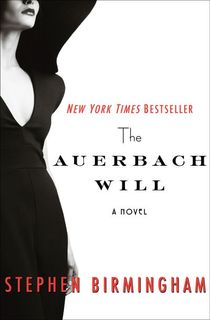
The Auerbach Will
Fans of the show Succession may enjoy the webs of family intrigue and deceit surrounding the titular Auerbach Will. The passing of the Auerbach’s patriarch, Jack, sends the family scrambling to form alliances, fighting to come down on the perceived right side of the family. Jack leaves behind a widow, Essie, who’s determined to marshal the effects of her family’s greed and in-fighting.
The Auerbach Will traces the history of Jack and Essie’s lives, exploring the hardships that they faced shortly after marrying. Their union leads to Jack’s splitting from his family, leaving him ostracized by his wealthy family in Chicago. Jack rebuilds his wealth with Essie’s help, creating an entrepreneurial empire and raising their family as they rub shoulders with the luminaries of their age.
The novel finds Essie making arrangements and preparing for her annual Christmas tree-trimming party. She knows that her children are beginning to circle like vultures, planning to come to her with requests of changing the will. But even in her old age, Essie is determined to remind her family who’s boss.

Shades of Fortune
Shades of Fortune is a perfect fit of fans for the angst and messiness that comes with the lovers to enemies trope. Mireille “Mimi” Myerson is the heir to the Miray cosmetic line, and has been struggling to revive the empire that her grandfather, Adolphe Myerson, left behind. The start of the novel finds Mimi in search of two unknown models, “faces that will belong exclusively” to her as she works on launching a new perfume campaign.
The perfume line is one of the last vestiges of hope and enterprise that Mimi has in the company as she tries to battle against the degradation of her personal life. Her husband’s affair knocks her off-balance, her son’s internalized antisemitism is a cruel shock to her family unit, and the resurfacing of her former first love sends Mimi barreling down a path she never anticipated.
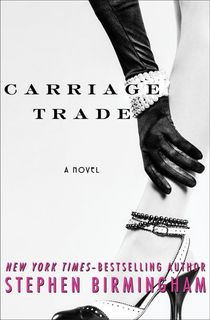
Carriage Trade
The aloof, but innovative founder of Tarkington’s on 5th Avenue, Silas “Sy” Tarkington’s has died, shocking his family. The well-known, revered, and often hated man leaves behind a retail empire for the Tarkingtons to manage. The questionable circumstances around Sy’s sudden passing are as much a mystery as the retail tycoon’s past. Silas’ daughter, Miranda, struggles to fill her father’s shoes in a world he always discouraged her participation in.
As Miranda tries to stabilize her father’s business, she grapples with the potential, horrifying truth behind his death. Silas was found floating in the pool of his mansion, leaving the family with more questions than answers. His second wife, Consuela, called a close friend rather than 911 when she found his body. As Miranda tries to reconcile these facts, she’s faced with the reemergence of her father’s side of the family into her life, and discovers her father’s tendency toward infidelity.
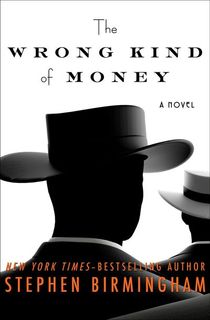
The Wrong Kind of Money
The Lieblings of New York have all of the wealth and power one could desire. Despite this, they find themselves on the outside of fashionable society. Their family business, the Ingraham Corporation, was started by Jules Liebling, and has been maintained by his widow since his death. Their son, Noah, is set to take over the company, but he’s in no place to take over society.
Society has always shunned the Lieblings, and it seems that they’ll remain on the outside…until one of the inner circle decides that bringing them in would be in their best interests. It’s not a smooth transition. Integrating into high society means that the glitterati are poking through the skeletons in the Liebling’s closet, examining their business—and how they made their millions in the first place.
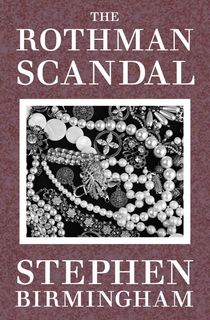
The Rothman Scandal
Drawing on his wealth of knowledge around New York history and the infleunce of Russian Jewish immigrants on American culture, Birmingham’s The Rothman Scandal revolves around a publication conglomerate and the family that runs it.
The editor, Alex, is the granddaughter-in-law of the founder, H. O. Rothman. As she struggles to maintain the quality of the magazine, she finds her position under threat from an associate’s mistress.

The Tower of Love
The Towers of Love explores the heartbreaking tale of the one that got away. Hugh Carey finds himself trapped between two of the most important women in his life: his mother, and the woman that he once loved. Hugh struggles to find his footing as he takes stock of the way his marriage has disintegrated. Returning to the suburban town he was raised in reawakens painful memories, and puts him back in contact with Edrita Smith, the girl next door.
While this reconnection with Edrita may seem like a bright spot in the darkness, it soon becomes apparent that his mother has a deep-rooted dislike of Edrita. Sandy Carey seems fixated on keeping her son away from anyone that she disapproves of—by any means necessary.
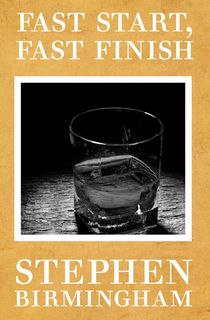
Fast Start, Fast Finish
Birmingham’s abiding interest in the hollow aspects of high society endures in Fast Start, Fast Finish. The novel revolves around the Lord family, headed by a well-to-do businessman whose recent move to the Lane places him at the center of seventies suburbanite culture. He and his wife, Nancy, grapple with settling into their new home with their son, Harold.
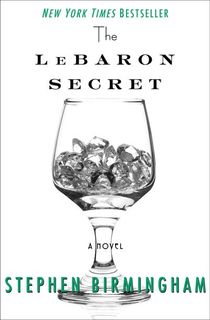
The LeBaron Secret
In the mold of Birmingham’s other strong fictional matriarchs, Assaria “Sari” LeBaron still controls the Baronet Vineyards, despite her age—and against the wishes of some other family members. Her son Eric, in particular, is tired of withering in his mother’s shadow.
In the vein of Succession’s Kendall Roy calling a vote of no-confidence on his father, Eric has been quietly aligning himself with key players across his family and industry, determined to commandeer the Baronet Vineyards by any means necessary.
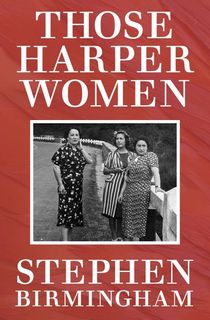
Those Harper Women
This sweeping historical saga is focused on Edith Harper, the eldest daughter of a Prohibition bootlegger. Now in her seventies, she inhabits a mansion with her twenty-seven year old granddaughter, Leona.
Leona is unlucky in love, having been married and divorced three times. Birmingham explores the darker side of privilege and secrecy in Those Harper Women as Edith and Leona struggle to reconcile their pasts and find a firm footing for their futures.
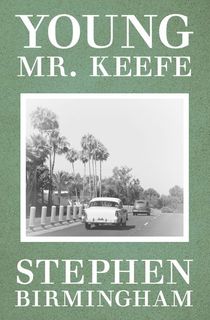
Young Mr. Keefe
Blending the idea of American Manifest Destiny and the evolving upheaval of 1950s America, Young Mr. Keefe tells the story of a twenty-four year old who moves to California to restart his life.
A reedy, dark-headed youth, Jimmy Keefe moves into a furnished modern apartment on Capitol Avenue. He begins to make friends, embedding himself in society, but hides a painful secret: a mounting stack of legal papers tucked away in his dresser, awaiting for his attention and signature.

Heart Troubles
This collection of short stories delves into the darker aspects of the upper reaches of American society. Heart Troubles weaves Birmingham’s interest in American elitism with the more worrisome aspects of human nature.
Nonfition Stephen Birmingham Books
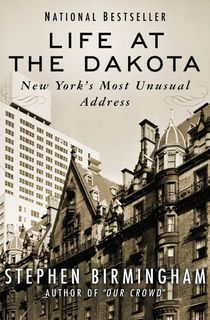
Life at the Dakota
While it may seem unorthodox for a book to be written around a single address in the concrete jungle, Birmingham’s Life at the Dakota tells the history of one of the most exclusive addresses in New York City. Built by Edward Clark, the owner of the Singer sewing machine company, the Dakota was a luxury apartment building that housed some of the most well-known and well-respected inhabitants in Manhattan.
Erected in 1884 and comprising of over sixty apartments with up to twenty rooms, the Dakota’s expansive layout once included tennis courts, a playroom, a gymnasium, a garden, and stables, among other things. The Dakota’s layout was also outfitted with the amenities that one might expect to find in a mansion, located near Central Park, which was, at the time, a somewhat unfashionable address.
Over the course of the Dakota’s lifetime, it housed an array of famous tenants, including Lauren Bacall, John Lennon and Yoko Ono, Boris Carloff, and Leonard Bernstein. It was also the setting of Rosemary’s Baby. Published one year before John Lennon was fatally shot outside of the residence, Birmingham uses the colorful inhabitants of the Dakota to delve into some of the most interesting facets of New York’s expansive history, using its tenants and goings on to trace the city’s evolution.
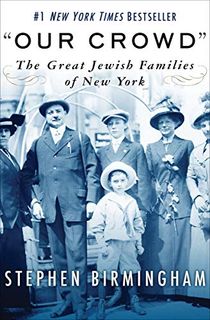
"Our Crowd"
If you’ve seen HBO’s The Gilded Age, you’re familiar with the exclusivity of “the 400”—the small, well-moneyed crowd that ruled New York society with an iron fist. When German Jews emigrated to America during the early nineteenth century, they were shut out of the upper echelons. Facing this discrimination, they built a society of their own.
Birmingham’s Our Crowd delves into “the 100,” the elite German-American Jewish society created by the likes of families like the Lehmans, Guggenheims, Goldmans, and Sachs, to name a few. He follows the roots of several rags-to-riches stories, conveying the atmosphere and sentiment of the era.
Birmingham also writes about the pervasive antisemitism of the time, exploring the effects that it had on the families, despite the heavy reliance that many institutions and establishments came to have on New York society.
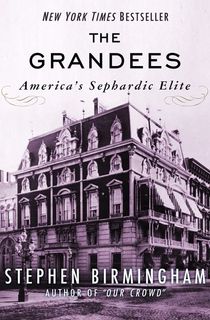
The Grandees
The Grandees digs into the history of the Sephardic Jews. Birmingham recounts their journey from the cruelty and exile imposed on them by the Spanish Inquisition, to their eventual immigration to the United States. The twenty-three Sephardic Jewish families settled in New York in 1654, eventually branching out as their families and the city evolved.
Beyond delving into the wealth of histories around Sephardic Jews in America, The Grandees explores the similarities and differences between Sephardic Judaism and the other religions that are a prevalent part of the American landscape. Birmingham’s survey of Sephardic roots and growth offers a number of recognizable names, delving into an aspect of their previously little-explored history.
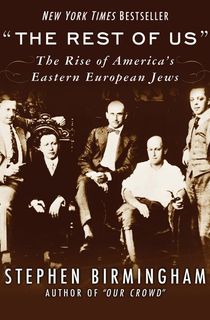
"The Rest of Us"
In The Rest of Us, Birmingham delves into the second migration of the Jewish people from Russia, to Poland, then to the US over the course of the late nineteenth century and into the twentieth century. Between the years 1880 and 1914, more than one million Polish and Russian Jews arrived in New York. Birmingham goes into great detail around the culture and environment that they immigrated into, as well as connecting the dots back to the homes that many of them were forced to leave behind.
The Rest of Us contains the breadth of experience faced by Polish and Russian Jews, as well as the impact that they made on American culture. Well-known members of this group, including Samuel Goldwyn, Louis B. Mayer, Irving Berlin, Ralph Lauren, the Marx Brothers, David Sarnoff, and makeup mogul Helena Rubenstein, would go on to influence large swaths of American fashion and culture.
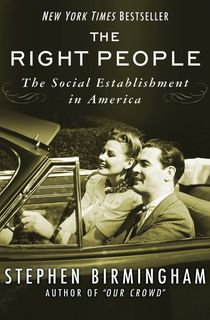
The Right People
Beyond the idea that celebrities are "just like us" is the truth of the matter—the ultra-wealthy are nothing like us, and they don’t want to be. Written in 1958 and originally published in 1968, The Right People: The Social Establishment in America explores the foundation and attitudes of the ultra-wealthy, their habits, and their lifestyles in the 1950s.
Birmingham introduces the reader to some of the most prominent, “old money” American families. He examines their traditions and rituals, as well as their likes, dislikes, and regular haunts.
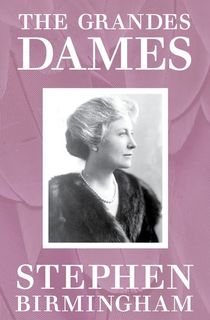
The Grandes Dames
Similar to the grandeur and history displayed in The Right People, Birmingham explores the roots of some of the most well-known families in history, focusing on the women who have helped bring and keep these families in a place of prominence. Birmingham depicts the lives of rich women, taking full advantage of the wealth generated by their fathers and husbands, and participating in philanthropy to charitably spread their fortune.
The Grandes Dames particularly explores eight American socialites who heavily influenced the development of the East Coast, from the stringent society of the Gilded Age to the uncertainty and upheaval of the Second World War. The women of families like the Astors, McCormicks, and Rockefellers heavily influenced the museums, opera houses, communities, and charities that still have a marked imprint on society.
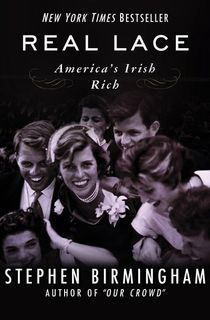
Real Lace
Originally published in 1973, Birmingham’s Real Lace explores the arrival, growth, and influence of several of America’s Irish Catholic families. This examination of the First Irish Families, or F.I.Fs, digs into the roots of the families that immigrated to the United States, many of whom made the journey over the course of the nineteenth century.
Birmingham looks at the state of the average Irish immigrant to give the reader a greater background and understanding into the ascension of the First Irish Families. From the people that made the most of the California Gold Rush to the overwhelming influence of the Kennedys, Real Lace explores the evolution and importance of the First Irish Family throughout American history.

Barbara Greer
Deeply embedded in the suburbanite enclave of Locustville, Pennsylvania, Barbara Greer can’t remember the last time she had any excitement. A housewife and mother to two boys, Dobie and Michael, she spends most of her days in her well-furnished, palatial house.
When a trip necessitates a visit to her hometown, Barbara is faced with a new dilemma—one that’ll test her limits, and her fidelity.

California Rich
This colorful portrait of the state of California analyzes the lives of the Americans who moved West in the hopes of building their fortunes and establishing their lives. Birmingham discusses the families that influenced the growth and establishments of California, and the conditions that they faced over the course of its history.
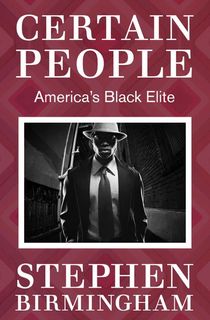
Certain People
In Certain People, Birmingham studies the state of the Black upper class over the course of the 1970s. A decade marred by the anti-war movement, civil unrest, the rise of the Cold War, and the Watergate Scandal, this book offers insight into a segment of Black society that isn’t often discussed or pictured in pop culture.
Birmingham discusses the lives and exploits of the prominent Black families in Atlanta, DC, Cincinnati, Memphis, and New York. He traces the origins of the most affluent families in these areas, exploring the power struggles faced within their own race, as well as American society as a whole.
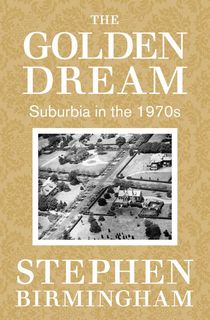
The Golden Dream
Originally published in 1978, The Golden Dream is part sociological study, part gossipy good time. Birmingham examines the roots of White American suburbia, tracing its history back to the land development that boomed as a result of the increased use of coaches, trains, and automobiles.
The reasons for the urban exodus varied, from a want of more room for children and pets to run around, to a growing racial bias against the diverse factors of city life, to the idea that moving to a suburb implied that a family had “made it” in America.
The Golden Dream examines the state of suburbs like River Oaks in Texas, Scottsdale in Arizona, and Salt Lake City in Utah during the 1970s.
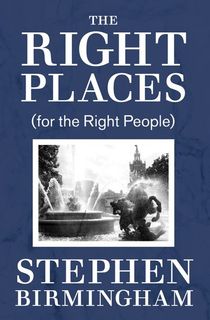
The Right Places
Originally published in 1973, The Right Places (for the Right People) explores nearly a dozen havens for the elite over the course of the 1970s. Birmingham catalogues the varying appeal and growth of Kansas City, Central Valley, Fort Lauderdale, West Virginia, North Carolina, the Alpines, Fairfield County, Sun Valley, Acapulco, and New York City—and delves into why London may be considered déclassé.
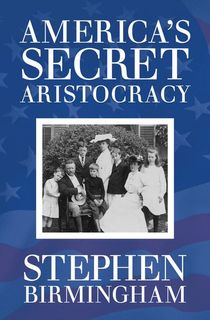
America's Secret Aristocracy
While most history-lovers are aware of the likes of the Vanderbilt's and the Astor’s places in American society, America's Secret Aristocracy explores the names that went into shaping history without having their names scattered across the papers. Birmingham delves into the principles of America's unofficial aristocracy, expounding on the ways in which it’s similar to European aristocracy, but without titles passing on between generations.
Conversely, the idea of America’s upper echelons of society are intertwined with the idea of American ingenuity, and a willingness to get our hands—dirty if need be.
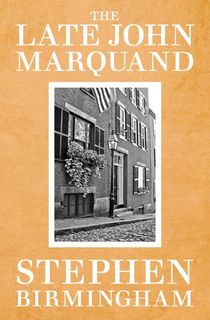
The Late John Marquand
Birmingham examines the life of a well-known satirist and fellow elite-focused writer in his biography of a social observer. The Late John Marquand offers the reader a portrait of an ambitious and anxious man as he made his way up a tight, narrow, and brittle social ladder.
Twice-married to old-money socialites, this book draws on personal interviews of friends and family who knew John well, and chronicles his social climbing and rise to literary prominence.

A Writer Writes
Birmingham’s memoir delves into the upbringing and interests in the author’s own words. He expounds on some of the great friendships and anecdotes of his life, including an affair with Ava Gardner.
